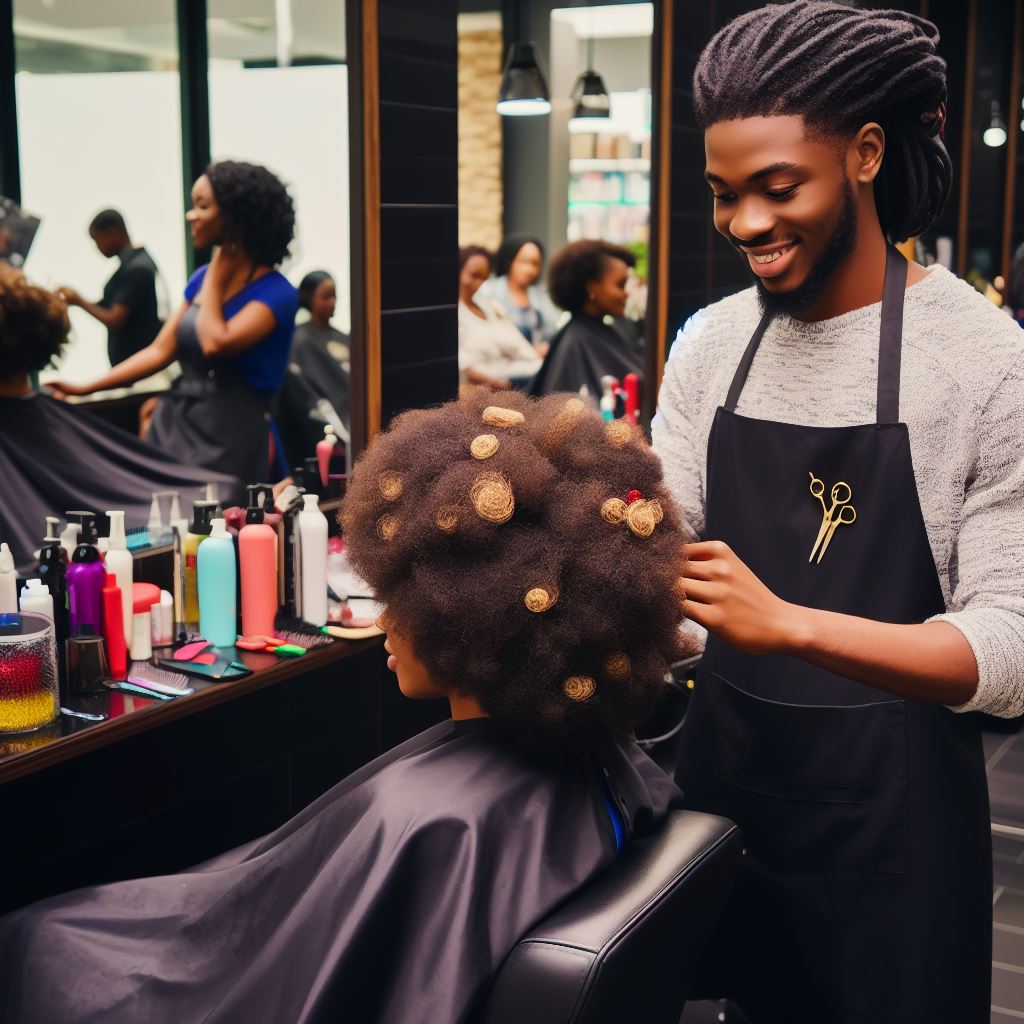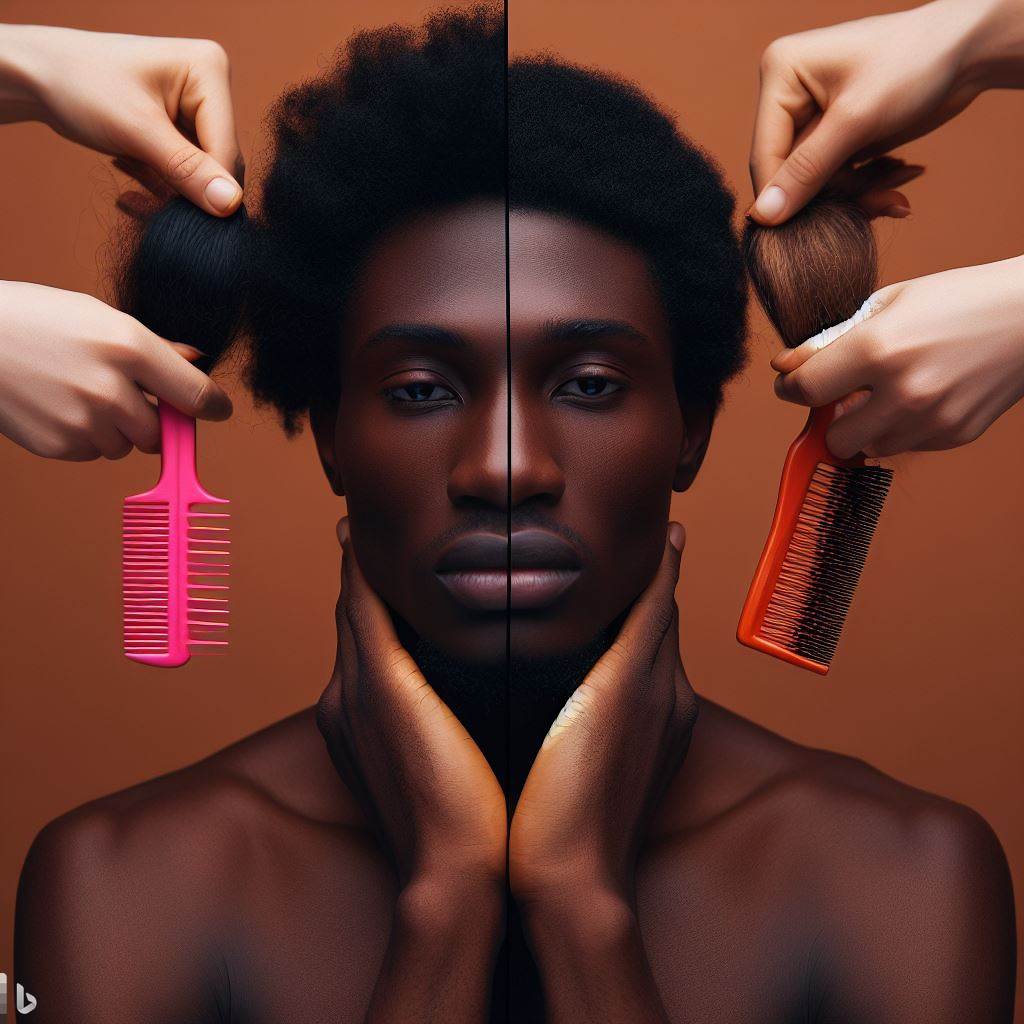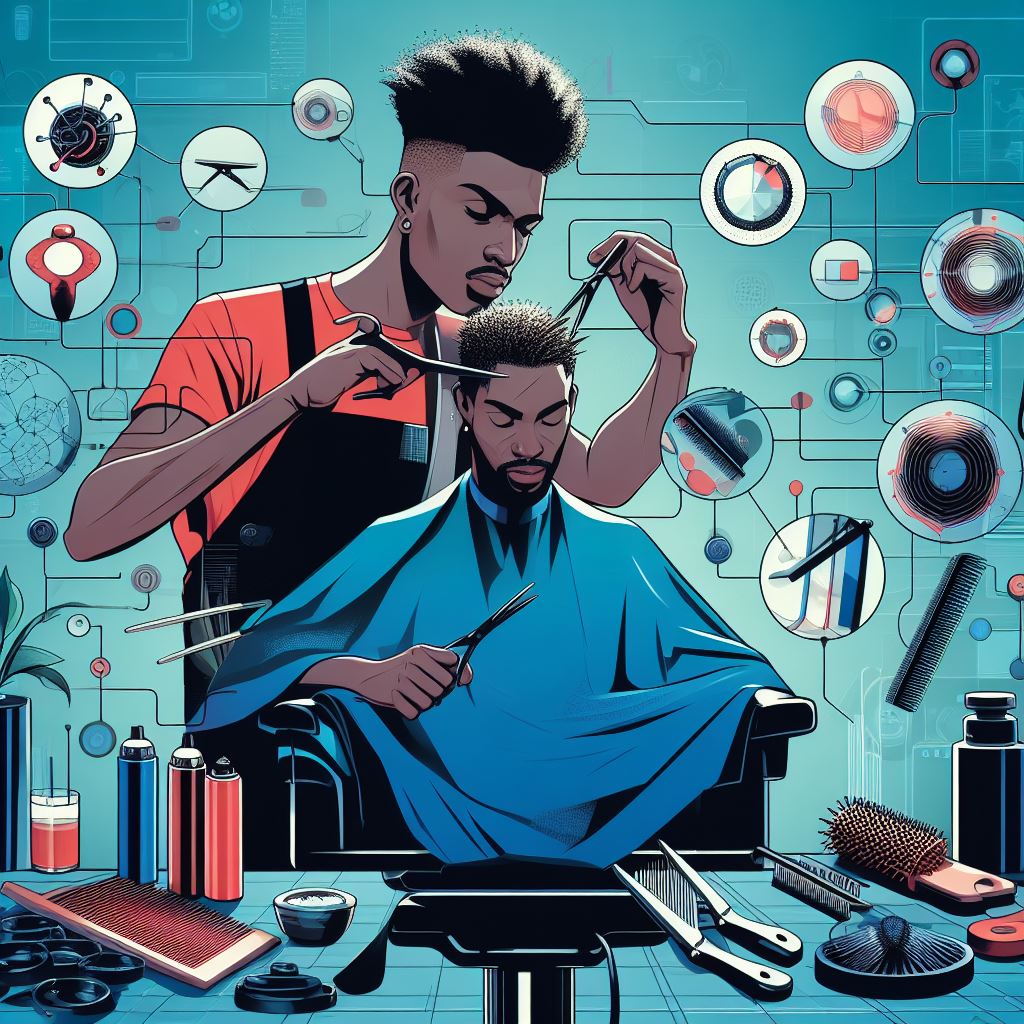Introduction
Regulations are rules and guidelines set by the government to govern certain activities or industries.
Definition of regulations
Regulations are important in ensuring the safety, professionalism, and quality of services provided by hair stylists.
Importance of regulations for hair stylists
Regulations help to protect the health and safety of both the hair stylists and their clients.
They ensure proper sanitation, hygiene, and use of safe products.
Overview of the hair styling industry in Nigeria
The hair styling industry in Nigeria is a thriving and lucrative sector. It provides employment opportunities for many professionals, both in salons and as freelancers.
However, without proper regulations, the industry can become chaotic and unregulated, leading to issues such as unqualified stylists, poor sanitary conditions, and use of harmful chemicals.
Regulations are necessary to maintain a level playing field, protect the rights of hair stylists, and ensure fair competition.
In Nigeria, the Lagos State Government has implemented regulations for hair stylists, including licensing requirements, training programs, and inspections.
These regulations aim to raise the standards of the industry, protect consumers, and promote professionalism among hair stylists.
In the end, regulations play a crucial role in the hair styling industry in Nigeria.
They ensure the safety, professionalism, and quality of services provided, and promote the growth and development of the industry.
Licensing Requirements for Hair Stylists in Nigeria
- Completion of formal education in hairstyling from a recognized institution is a prerequisite for licensing.
- Submitting an application to the relevant licensing authority is necessary to start the licensing process.
- Proof of identity, such as a valid identification card or passport, must be provided along with the application.
- Evidence of completion of a specified number of training hours or apprenticeship is required for licensing.
- Providing a letter of recommendation from a professional hairstylist is often necessary to support the application.
Certification and Training Requirements
- Prospective hair stylists must complete a certified hairstyling program to acquire the necessary skills.
- Certification programs cover various aspects of hairstyling, including cutting techniques, coloring, and styling.
- These programs are offered by accredited institutions and can range from several months to a year.
- Practical training is an integral part of the certification program, allowing students to gain hands-on experience.
- Upon successful completion of the program, students receive a certification that demonstrates their competence.
Examination Process for Obtaining a License
- After fulfilling the educational and training requirements, applicants may have to pass a licensing examination.
- The examination may include both written and practical components to assess the applicants’ knowledge and skills.
- Written exams cover topics like hair care, sanitation practices, styling techniques, and relevant regulations.
- Practical exams require candidates to demonstrate their proficiency in hairstyling, including cutting and coloring.
- Successful completion of the examination is necessary to obtain a license as a professional hair stylist in Nigeria.
Duration and Cost of Licensing
- The duration of the licensing process can vary depending on factors such as the applicant’s qualifications and the efficiency of the licensing authority.
- On average, it may take several weeks to a few months to complete the licensing process.
- The cost associated with obtaining a hair stylist license includes application fees, examination fees, and certification program fees.
- These costs can range from a few thousand to tens of thousands of Nigerian Naira, depending on various factors.
- It is important to consider these expenses while pursuing a career as a licensed hair stylist in Nigeria.
Importance of Licensing for Professionalism and Safety
- Licensing ensures that hair stylists have received the necessary education and training to provide quality services.
- It promotes professionalism among hair stylists and maintains certain standards within the industry.
- Licensed hair stylists are equipped with the knowledge of proper sanitation practices, reducing the risk of infections.
- Customers can have peace of mind knowing that licensed stylists have demonstrated their skills through examinations.
- Licensing also creates a sense of trust between the stylists and clients, helping to build a strong client base.
By adhering to licensing requirements and completing the necessary training, hair stylists in Nigeria can enhance their professionalism, ensure safety standards, and build successful careers.
Read: Working as a Freelance Hair Stylist in Nigeria
Health and Safety Regulations for Hair Stylists in Nigeria
Hair stylists in Nigeria are required to adhere to health and safety regulations to prevent the spread of diseases and create a safe environment for their clients.
The regulations impacting hair stylists in Nigeria are essential for ensuring the health and safety of both the stylists and their clients.
These regulations cover various aspects, including maintaining hygiene and sanitation, clean working areas, proper disposal of waste and chemicals, and the use of clean and sterilized tools and equipment.
Importance of Maintaining Hygiene and Sanitation
Maintaining hygiene and sanitation is crucial to prevent the transmission of infections and ensure client satisfaction.
Stylists must regularly wash their hands, sanitize their tools, and maintain a clean workspace.
Requirements for Clean and Well-maintained Working Areas
Hair stylists must keep their working areas clean, clutter-free, and well-maintained.
This includes regularly sweeping the floors, wiping surfaces, sanitizing chairs, and ensuring proper ventilation.
Proper Disposal of Hair Waste and Chemicals
Hair waste, such as cut hair and used chemicals, must be disposed of properly to prevent environmental pollution and potential health hazards.
Nigerian hair stylists should follow proper waste disposal guidelines set by local regulatory authorities.
Ensuring the Use of Clean and Sterilized Tools and Equipment
Using clean and sterilized tools and equipment is essential to prevent the transmission of infections between clients.
Hair stylists should regularly sanitize their combs, brushes, scissors, and other tools to maintain high hygienic standards.
To comply with these regulations, hair stylists can follow the given guidelines:
- Create a schedule for routine disinfection and cleaning of work areas and tools.
- Provide hand sanitizers and encourage both stylists and clients to clean their hands before and after services.
- Use disposable and single-use items whenever possible to minimize the risk of cross-contamination.
- Educate stylists on proper waste disposal methods and provide appropriate disposal containers for hair waste and chemicals.
- Implement a regular maintenance plan for equipment sterilization, such as using autoclaves or chemical solutions recommended by health authorities.
Following these regulations ensures the safety and well-being of both the hair stylists and their clients.
It also helps to maintain a professional and trustworthy image, which is crucial for the success of any hair styling business.
In short, health and safety regulations play a significant role in the hair styling industry in Nigeria.
Hair stylists must adhere to these regulations to maintain hygiene, prevent the spread of diseases, and create a safe environment for their clients.
By following guidelines such as maintaining cleanliness, proper waste disposal, and sterilizing tools, stylists can provide excellent services while prioritizing the health and safety of everyone involved.
Read: Beauty Schools in Nigeria: A Stylist’s Education Path

Consumer Protection Regulations for Hair Stylists in Nigeria
Being a hair stylist in Nigeria comes with a lot of responsibilities, not just in terms of providing excellent service and styling skills, but also in complying with consumer protection regulations.
These regulations are in place to ensure that clients are treated fairly and receive quality service.
In this section, we will explore the key regulations impacting hair stylists in Nigeria.
Displaying Price Lists and Providing Clear Service Explanations
- It is mandatory for hair stylists in Nigeria to display their price lists prominently in their salons.
- Clients should have complete transparency when it comes to the costs of various services.
- Additionally, stylists must provide clear explanations of the services offered and any additional charges or packages.
Policies for Refunds or Adjustments in Case of Dissatisfaction
- When a client is dissatisfied with the service provided, hair stylists must have a policy for refunds or adjustments.
- It is important to address client grievances promptly and ensure customer satisfaction.
- Having a clear policy in place demonstrates professionalism and builds trust with clients.
Obligations to Give Accurate and Honest Advice to Clients
- Hair stylists have a moral and ethical obligation to give accurate and honest advice to their clients.
- Recommendations regarding hairstyles, treatments, and products should be based on the client’s needs, rather than sales motives.
- Stylists should provide information about potential risks, allergies, and proper maintenance of hairstyles to clients.
Dealing with Complaints and Resolving Disputes
- As a hair stylist, it is crucial to have a system in place for dealing with client complaints and resolving disputes.
- Listening to client concerns, offering solutions, and maintaining open communication are essential.
- If a resolution cannot be reached, hair stylists should be aware of relevant legal channels for dispute resolution.
In fact, consumer protection regulations play a significant role in shaping the practices of hair stylists in Nigeria.
These regulations aim to ensure that clients receive fair treatment, transparent pricing, and quality service.
By adhering to these regulations, hair stylists can build trust, loyalty, and a positive reputation among their clients.
Read: Nigeria’s Hair Stylist Unions and Associations
Existing challenges with hair styling regulations in Nigeria
- Lack of enforcement mechanisms: The major challenge faced by hair stylists in Nigeria is the lack of proper enforcement mechanisms for regulations.
- Inconsistencies in regulations across different states: Another challenge is the inconsistencies in regulations governing hair styling across different states in Nigeria.
- Limited awareness and understanding of regulations among hairstylists: Many hairstylists in Nigeria have limited awareness and understanding of the regulations that govern their profession.
- Need for continuous education and training on updated regulations: There is a need for continuous education and training on updated regulations to ensure hairstylists stay compliant.
Effective regulations are the backbone of any profession, safeguarding practitioners and clients alike.
In Nigeria, hair stylists grapple with hurdles in the existing regulatory landscape.
Enforcement poses a formidable challenge, with regulations lacking the teeth needed to ensure compliance.
State-to-state disparities add complexity, making adherence a puzzle for stylists working across borders.
Moreover, a pervasive lack of awareness leaves many stylists inadvertently non-compliant, jeopardizing safety.
To fortify the industry, a call for uniform, well-enforced regulations echoes.
Equipping stylists with continuous education on evolving standards is equally vital.
Addressing these challenges is pivotal to nurturing a safer, more professional hair styling landscape in Nigeria.
Read: Cultural Hair Styles in Nigeria: A Stylist’s Insight
Potential Improvements and Solutions
Strengthening enforcement agencies and mechanisms
To address the regulations impacting hair stylists in Nigeria, it is crucial to strengthen the enforcement agencies and mechanisms responsible for overseeing these regulations.
This includes providing them with the necessary resources, personnel, and training to effectively carry out their duties.
Standardizing regulations nationwide
Another potential improvement is the standardization of regulations nationwide. Currently, regulations for hair stylists vary across different states in Nigeria, leading to confusion and inconsistency.
By implementing uniform regulations, it will be easier for hair stylists to understand and comply with the requirements.
Collaborating with industry associations for better regulation communication
Effective communication between regulation authorities and hair stylists is essential.
Collaborating with industry associations can help bridge this gap by establishing channels for clear and timely communication.
This can involve regular meetings, workshops, or the development of online platforms to disseminate information regarding regulations.
Facilitating education and training programs for hair stylists
Education and training play a vital role in ensuring hair stylists are well-equipped to comply with regulations and deliver quality services.
Implementing and facilitating training programs that cover both technical skills and regulatory compliance will help raise industry standards and enhance professionalism among hair stylists.
Potential improvements and solutions for better regulations impacting hair stylists in Nigeria
Addressing the challenges faced by hair stylists in Nigeria requires a comprehensive approach that considers potential improvements and solutions.
By strengthening enforcement agencies and mechanisms, standardizing regulations, collaborating with industry associations, and facilitating education and training programs, these challenges can be effectively addressed.
Conclusion
Regulations are crucial in ensuring the safety and professionalism of hair stylists in Nigeria.
These regulations aim to protect both the stylists and their clients.
Throughout this blog post, we have discussed various regulations impacting hair stylists in Nigeria.
We have highlighted the importance of these regulations in maintaining the quality of service and preventing potential harm.
It is essential for hair stylists to comply with these regulations to maintain a high standard of professionalism.
By adhering to the rules and guidelines set by regulatory bodies, hair stylists can provide a safe and enjoyable experience for their clients.
However, it is not enough to simply comply with existing regulations.
Continuous advocacy is necessary to push for improved regulations in the industry.
This will help address any gaps or shortcomings in the current regulations, ensuring that they remain relevant and effective in the ever-changing landscape of the hair styling industry.
Hair stylists must take an active role in advocating for improved regulations.
They can join industry associations and participate in discussions and initiatives that aim to enhance the standards and regulations for their profession.
By advocating for improved regulations, hair stylists can contribute to the overall growth and development of the industry.
They can also help create a safer and more professional environment for themselves and their clients.
In summary, regulations for hair stylists in Nigeria play a vital role in ensuring safety, professionalism, and the overall quality of service.
It is crucial for hair stylists to comply with these regulations and actively advocate for continuous improvement in the industry.
Together, we can create a thriving and regulated environment for the hair styling profession in Nigeria.




